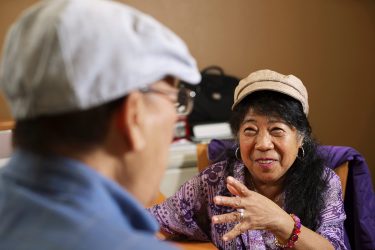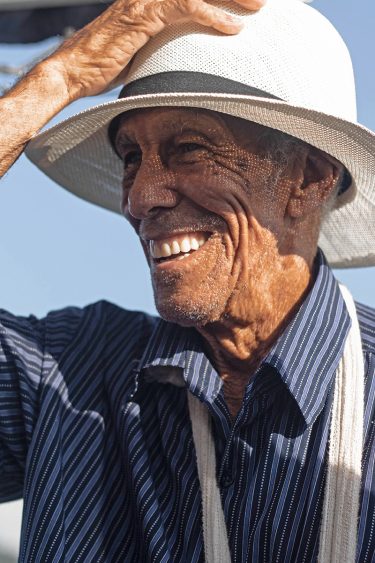Help Older Adults With Depression Create Happier, Healthier Lives
The Program to Encourage Active, Rewarding Lives or PEARLS educates older adults about what depression is (and is not) and helps them develop the skills they need for self-sufficiency and more active lives. The program takes place in six to eight sessions over the course of four to five months in an older adult’s home or a community-based setting that is more accessible and comfortable for older adults who do not see other mental health programs as a good fit for them. PEARLS also allows for coordination with their current health care providers where appropriate.
No Counseling Experience or Higher Education Needed
PEARLS is simple and easy to administer by staff at community-based organizations who might not have previous counseling experience or a higher education. There is PEARLS training that prepares staff to provide the program to community members.
No Depression Diagnosis Needed
Older adults do not need to be clinically diagnosed with depression in order to participate in PEARLS. Organizations screen potential participants for depressive symptoms using tools we can provide.
PEARLS Is Flexible & Adaptable to Community Needs
It is adaptable to various community needs and helps expand access to depression care in underserved communities, including rural ones. It is a program for all older adults, especially those who have limited access to depression care because of systemic racism, trauma, language barriers, low income, and/or where they live. This is because PEARLS was designed in collaboration with the organizations that deliver it, validated in partnership with the communities who use it, and adaptable to the people who need it.
“All these skills helped me realize I can have a life I enjoy. Before PEARLS, I did not see beyond a day.”
– PEARLS participant
What Makes PEARLS Different

PEARLS is one of only a handful of programs that focuses on helping older adults develop the skills they need to maintain their health, happiness, and independence. The program is part of a cultural shift in how depression is managed by and for aging community members. Most programs address depression in older adults using only the clinical mental health toolkit (counseling and/or medication), while PEARLS focuses on skill building.
Short-Term Sessions With Results
PEARLS coaches (the name we give frontline staff at community-based organizations providing the program) meet one-on-one with older adults for six to eight one-hour sessions, typically over the course of four to five months. The program begins with weekly sessions that gradually taper to monthly. This is a common skill-building technique used to support people in gradually learning to problem solve on their own.
What PEARLS Has to Offer
- Empower older adults by teaching them skills necessary to take action and make lasting life changes so they can lead more active and rewarding lives.
- Offer a client-driven team-based approach.
- Allow collaboration with older adults in their homes or other accessible community settings during six to eight PEARLS sessions over the course of four to five months.
- Improve quality of life, as well as reduce depressive symptoms.
- Support older adults regardless of their backgrounds and experiences.
People in the following communities or groups have participated in PEARLS:

These communities and groups may overlap and intersect.
- People who have limited or lower incomes in rural or urban areas
- People living in rural areas across the U.S.
- People living alone in rural or urban areas
- People with chronic health conditions, including diabetes, hypertension, arthritis, and/or epilepsy
- People with disabilities, including limited sight, limited hearing, and/or wheelchair or assistive-device users
- Military veterans and their partners
- LGBTQIA+ community members
- People who are incarcerated or unhoused
- Black community members who use Amharic, English, Soomaali/Somali, and/or Spanish languages
- Alaska Native and Native American community members who use English
- Asian American community members who use Arabic, Cantonese, English, Gujarati, Hindi, Ilocano, Khmer, Korean, Mandarin, Punjabi, Tagalog, Urdu, and/or Vietnamese languages
- Pacific Islander community members who use Chuukese, English, and/or Marsahllese languages
- Latino and Mixteco community members who use English and/or Spanish languages
- Jewish community members
- White community members who use English, Russian, Spanish, and/or Ukrainian languages

PEARLS is adaptable and flexible to the unique needs and perspectives of individuals and communities. The program recognizes that different communities celebrate their elders in different ways and is designed to build on those strengths.
The UW Health Promotion Research Center continues to build and expand its PEARLS partnerships, which are key to the success and effectiveness of the program.
Are you part of an organization that provides funding for evidence-based programs like PEARLS?
The University of Washington Health Promotion Research Center joins forces with funders, businesses, and nonprofits that share our values about community health and aging. With the Program to Encourage Active, Rewarding Lives or PEARLS, we advocate for funding where it can have the greatest impact, while partnering with community-based organizations to expand the impact of PEARLS in their communities.
Together, we can provide older adults access to the depression care they need and deserve.
PEARLS History
The University of Washington Health Promotion Research Center (UW HPRC) provides long-standing and deeply rooted support for PEARLS, including its establishment as an evidence-based program. Our center has supported PEARLS from its early development. We are committed to its success.
How It Started
The UW Health Promotion Research Center (UW HPRC) bridges the public and private sectors, uniting nonprofits, businesses, government organizations, and community networks toward a common goal.
PEARLS began in the late 1990s when the director of Aging and Disability Services, the area agency on aging for Seattle and King County, approached the UW Health Promotion Research Center for a way to serve older adults with depression, including those served by the agency’s home- and community-based services program and/or those who might not have a clinical diagnosis of depress. Depression is high among older adult who are homebound; when we analyzed data from 16,032 elders receiving HCBS in Washington state in 2005, two-thirds met criteria for clinical depression. Older adults do not need a depression diagnosis to participate in PEARLS. In fact, we know depression can appear as sadness, frustration, loneliness, or loss of interest in activities someone once loved.
The academic-community partnership between the university and local aging service providers resulted in PEARLS as a way to support older adults and increase access to mental health services.
Where It Is Today
PEARLS continues to be shared in close partnership with community-based organizations, as well as local, state, and national agencies working to improve the health and well-being of older adults.
More than 9,400 older adults and 133 organization across 26 states have participated in PEARLS.
The UW Health Promotion Research Center provides PEARLS training that prepares staff at your organization to provide the program to older adults in your community. We are a partner and a champion for communities and organizations adopting PEARLS. From the moment we connect, we are there to support your success — every step of the way.
We hope you will join us in our collaboration to help older adults live happier, healthier lives.



